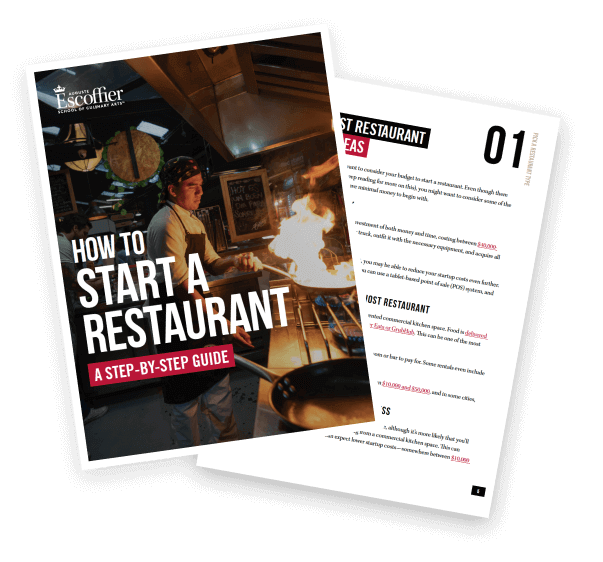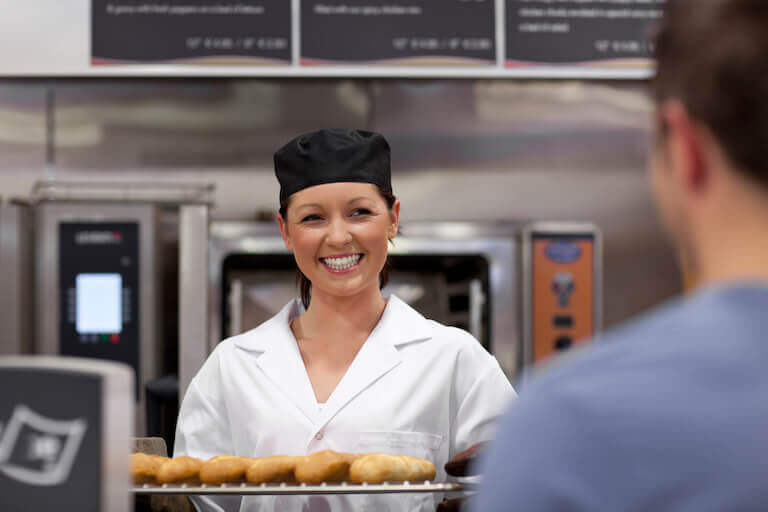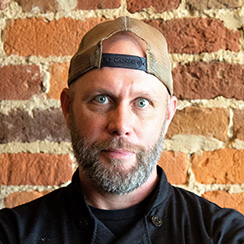Many people, including entrepreneurs, believe that the best way to learn something is by doing it—to jump in and get going, making course corrections and pivoting as necessary.
Maybe you’re a restaurant owner who did exactly that. Whether you had already worked as a chef or elsewhere in a kitchen—or simply had a great idea—you took your shot.
Now what? What’s the next step to take your business to another level? Does culinary school make sense for a business owner who’s already in the thick of things?
That’s ultimately for you to decide, but the answer is likely yes. As you’ve probably figured out by now, great food is just the start. The day-to-day of restaurant operation also involves business and budgeting expertise, marketing, interpersonal skills, sanitation and safety regulations, and the upkeep of a building.
A restaurant owner has a menagerie of responsibilities, each of them connected but vastly different. Read on to find out how culinary school can help.
Restaurants Can Live or Die by Their Bottom Lines
The industry notoriously runs on slim profit margins of about two to six percent, for which a few tweaks can make all the difference.
Escoffier’s online degree and diploma programs in Culinary Arts include introductory courses focused on yield cost analysis, portion sizing, and how to reduce waste. And the school’s Hospitality & Restaurant Management and Food Entrepreneurship programs put a keen focus on the business side of hospitality ventures.
Find Out How to Control Costs to Turn a Profit
In the Foodservice Math and Accounting course, students are introduced to accounting and managing budgets, focusing specifically on metrics that are related to restaurants and other food and beverage businesses.
Stay Relevant by Knowing Food Trends & Crafting Creative Menus
The culinary school environment can help keep you in the loop and keeps the spark of creativity burning. You are able to better stay on top of trends that can help you understand what customers want. This allows you to keep your favorite items while also getting creative with your menu and even your menu design.
As you explore course offerings and meet students and chef instructors who introduce you to new ideas, you might discover an interest in seasonal menus or world cuisine, or perhaps you want to know more about sustainability and zero-waste cooking. Escoffier’s Plant-Based Culinary Arts program can introduce students to a popular and potentially sustainable way of cooking and eating.
The Farm to Table Experience® focuses specifically on sustainable and locally-grown foods. It explores concepts such as traditional vs. nontraditional farming, as well as the impact of land and sea animal-based food sourcing as practiced globally. Certain programs at Escoffier can also expose students to cuisine from around the world that can help entrepreneurs stay current in the culinary field.

The business side of running a restaurant brings its own set of skills, apart from the culinary side.
Become More Attractive to Potential Investors
In addition to the foundational skills and acumen that can improve your culinary and business chops, culinary school might also provide you with some virtual gold stars to burnish your and your establishment’s reputations.
That extra bit of cachet might also impress potential investors, helping you to expand or improve upon your business. Investors typically appreciate business owners who have “skin in the game” and have invested in their businesses and their ongoing knowledge of an industry.
A degree or diploma can convey an expertise and commitment that can elevate your status in the culinary industry and in the eyes of potential investors.
It can also be a tool in your marketing plan, used to distinguish you from others, and any school-related awards might also help impress potential customers and investors. That type of expertise and knowledge could be part of your positioning statement as you clarify how you want your restaurant to be perceived.

Get the Essential Guide to Starting a Restaurant
Ready to start your own restaurant? Explore budget-friendly restaurant startup concepts, necessary licenses and permits, business planning tips, and more!
Sharpen Your Existing Skills
You likely entered the restaurant business with a set of skills you believed would catapult you to success, and maybe they have. But whether you were self-taught, learned them on the job, or were trained in a more formal environment, culinary skills can always be fine-tuned.
Some skills and knowledge everyone should be proficient at include knife skills, kitchen hierarchy, safety, business principles, and how to work commercial equipment. An education at Escoffier can help you enhance your existing understanding or provide new skills to add to your repertoire.
Lance McWhorter, a graduate of the online Culinary Arts program and entrepreneur, credits much of his success to his education. He’s been able to apply many of the skills he learned at culinary school in his Texas-based restaurant Culture ETX.
Restaurants Are in the People Business
Behind the clattering of plates and bowls and the hum of restaurant equipment are the people. As a restaurant owner, you interact with employees, customers, contractors, inspectors, investors, and more—so it’s imperative that your people skills are as impressive as your feature dishes.
Explore How to Effectively Manage Employees
In certain Escoffier programs, courses related to restaurant operations and foodservice management let students explore subjects like employee training and motivation, and how to create a safe and positive work environment.
Classes may also cover how to improve communication skills, conflict resolution, and cultural differences in communication.
These skills are not only vital to communicating with your employees, but also maintaining good relationships with vendors and customers.

It’s important for restaurant owners to understand how to work with a variety of people and personalities.
Network With Other Professionals
Networking is as important as any other skill, and you can discover great opportunities for it at Escoffier. Here, you can meet a number of people with a vast range of experience and goals, from those who have worked in kitchens for decades to other business owners.
Escoffier’s Chef Instructors have varied experience in entrepreneurship, plus you’ll interact with other students and alumni. An externship can also expose you to new people and help you when upskilling.
Graduates can also join the Escoffier Alumni Association. This online group provides access to networking opportunities, job boards, and career development events.
Create a Safe Working Environment by Keeping Abreast Of Local Food Regulations
As part of the Culinary Arts program, Escoffier’s Culinary Foundations course spends time on food safety and sanitation, focusing on the importance of proper food handling, food storage, cleaning, and pest control. This course also takes you through material found on the ServSafe® exam with lecture, knowledge checks, and food safety-related quizzes.
Students getting an associate degree or online diploma in Culinary Arts can expand upon the basics in the Culinary Entrepreneurship course and dive further into business planning and government regulations in the food service industry.
The dining public tends to place high value on establishments that demonstrate exceptional safety and sanitation practices—and so do employees.
Gain a Competitive Edge With Culinary School
There’s a difference between knowing how to do something and knowing how to do it professionally. Culinary school can prepare you for a competitive environment, or help you sharpen existing skills and mindset in that area.
An education at Auguste Escoffier School of Culinary Arts can also include programs in Hospitality & Restaurant Operations Management and Food Entrepreneurship, which include courses on business development. Escoffier offers programs in six specialties ranging from 30 to 84 weeks. You could complete a diploma program in as little as 30 weeks.
Running a restaurant is hard work with many components. Examining the business side of things as a culinary school student can allow you to better see the whole picture and transfer those skills to your business ventures. Take the first step towards your business goals and contact us today.
DISCOVER MORE WAYS TO IMPROVE YOUR RESTAURANT CAREER:
- 5 Skills Every Food Entrepreneur Should Have
- How to Improve the Ambiance of Your Restaurant
- How to Calculate Food Cost Percentage
This article was originally published June 2, 2021, and has been updated.
*Information may not reflect every student’s experience. Results and outcomes may be based on several factors, such as geographical region or previous experience.



